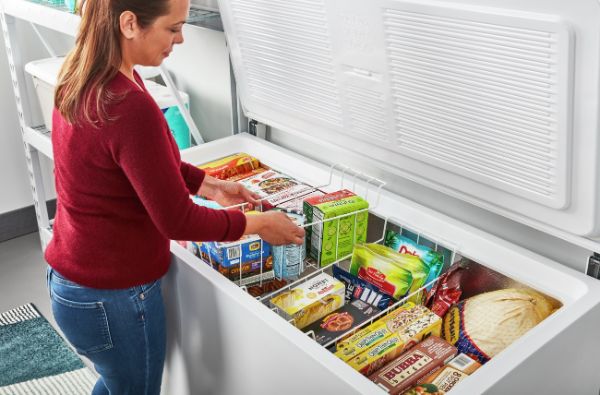Refrigerators and freezers are essential appliances in our daily lives, allowing us to store and preserve food at optimal temperatures. While both serve the purpose of keeping our perishable items fresh, there are significant differences between refrigerators and freezers.
In this article, we will explore and compare these two appliances, including their functions, temperature ranges, storage capabilities, and usage considerations.
Table of Contents
Temperature Ranges
The primary function of a refrigerator is to maintain a cool temperature range typically between 35 to 46 degrees Fahrenheit (2 to 8 degrees Celsius). This temperature range is ideal for storing a variety of perishable items, including fruits, vegetables, dairy products, beverages, and cooked leftovers. The cool temperature slows down the growth of bacteria and helps to extend the freshness of these items.
Freezers, on the other hand, are designed to operate at much lower temperatures, usually below 0 degrees Fahrenheit (-18 degrees Celsius). The freezing temperatures in freezers prevent the growth of bacteria and effectively preserve food items for longer periods. Freezers are suitable for storing frozen goods such as meats, seafood, frozen fruits and vegetables, ice cream, and prepared meals.
Functions and Storage Capabilities
Refrigerators consist of multiple compartments, including shelves, drawers, and door bins, providing ample space for storing a wide range of perishable items. The main purpose of a refrigerator is to cool and maintain the freshness of food, allowing you to store items for a few days to a week, depending on their shelf life. Refrigerators also have additional features like humidity controls for optimizing the storage of fruits and vegetables.
Freezers are specifically designed for long-term storage of frozen items. They typically contain pull-out drawers or shelves that provide organized storage space. Freezers allow you to store frozen goods for months, preserving their quality and nutritional value. Some freezers come with separate compartments or adjustable temperature settings, enabling you to store different types of frozen items at the ideal temperature.
Usage Considerations
Refrigerators are used on a daily basis to store perishable items that we consume within a shorter time frame. They are suitable for storing fresh produce, beverages, and leftovers, providing easy access to these items for regular use. Refrigerators are commonly found in kitchens and serve as a central hub for storing and organizing food items that require cooling.
Freezers play a vital role in preserving food for longer periods. They are ideal for storing bulk purchases, homemade meals, and items you wish to keep for an extended time. Freezers are commonly used in households, but they are also essential in commercial settings such as grocery stores, restaurants, and food manufacturing facilities where large quantities of frozen goods need to be stored.
Energy Efficiency
Refrigerators are typically more energy-efficient compared to freezers. Since refrigerators operate at higher temperatures, they require less energy to maintain the desired coolness. Modern refrigerators often come with energy-saving features like improved insulation, LED lighting, and smart controls that optimize energy consumption.
Freezers consume more energy due to the need for lower temperatures. The continuous operation of compressors and cooling systems to maintain freezing temperatures can result in higher energy usage. However, advancements in technology have led to the development of energy-efficient freezers with better insulation and improved compressor designs.
Combination Units
It is important to note that many modern refrigerators come with built-in freezer compartments or separate freezer units. These combination units provide the convenience of having both cooling and freezing capabilities in a single appliance.
This allows users to store a variety of food items, from fresh produce to frozen goods, all in one place. Combination units offer the flexibility to adjust the temperature settings for the refrigerator and freezer sections independently, ensuring optimal storage conditions for different types of items.
Refrigerator vs. Freezer
| Feature | Refrigerator | Freezer |
|---|---|---|
| Temperature Range | 35-46°F (2-8°C) | Below 0°F (-18°C) |
| Function | Cooling and preserving perishable items | Freezing and long-term storage of food |
| Storage Capacity | Multiple compartments for a variety of items | Pull-out drawers or shelves for frozen goods |
| Usage | Daily storage and easy access to fresh items | Preserving bulk purchases and long-term storage |
| Energy Efficiency | More energy-efficient compared to freezers | Higher energy consumption due to lower temperatures |
Conclusion
Understanding the differences between refrigerators and freezers is essential for efficient food storage and preservation. While refrigerators maintain cool temperatures to keep perishable items fresh for shorter periods, freezers operate at freezing temperatures to extend the shelf life of frozen goods. Each appliance serves a distinct purpose and offers specific storage capabilities.
Whether you need a refrigerator, a freezer, or a combination unit depends on your storage requirements, lifestyle, and the types of food items you regularly consume. Consider factors such as temperature ranges, storage capacities, energy efficiency, and usage considerations when selecting the right appliance for your needs.
Remember, proper organization and maintenance of your refrigerator or freezer are crucial to ensure food safety and prolong the lifespan of the appliance. Regularly clean and declutter the storage compartments, check temperature settings, and monitor the condition of the door seals to optimize performance.
Lastly, always refer to the manufacturer’s guidelines and recommendations for operating your refrigerator or freezer to maximize its efficiency and ensure the longevity of your appliance.
By understanding the distinctions between refrigerators and freezers, you can make informed decisions when purchasing and utilizing these appliances, allowing you to effectively store and preserve your food items based on their specific requirements.

